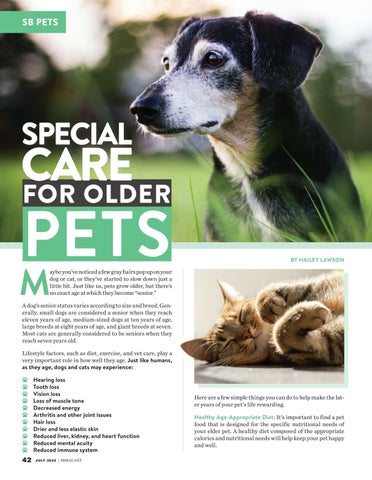SB PETS
SPECIAL
CARE FOR OLDER
PETS
M
BY HAILEY LAWSON
aybe you’ve noticed a few gray hairs pop up on your dog or cat, or they’ve started to slow down just a little bit. Just like us, pets grow older, but there’s no exact age at which they become “senior.”
A dog’s senior status varies according to size and breed. Generally, small dogs are considered a senior when they reach eleven years of age, medium-sized dogs at ten years of age, large breeds at eight years of age, and giant breeds at seven. Most cats are generally considered to be seniors when they reach seven years old. Lifestyle factors, such as diet, exercise, and vet care, play a very important role in how well they age. Just like humans, as they age, dogs and cats may experience:
Ř Ř Ř Ř Ř Ř Ř Ř Ř Ř Ř
42
Hearing loss Tooth loss Vision loss Loss of muscle tone Decreased energy Arthritis and other joint issues Hair loss Drier and less elastic skin Reduced liver, kidney, and heart function Reduced mental acuity Reduced immune system JULY 2022
| SBMAG.NET
Here are a few simple things you can do to help make the later years of your pet’s life rewarding. Healthy Age-Appropriate Diet: It’s important to find a pet food that is designed for the specific nutritional needs of your elder pet. A healthy diet composed of the appropriate calories and nutritional needs will help keep your pet happy and well.

















